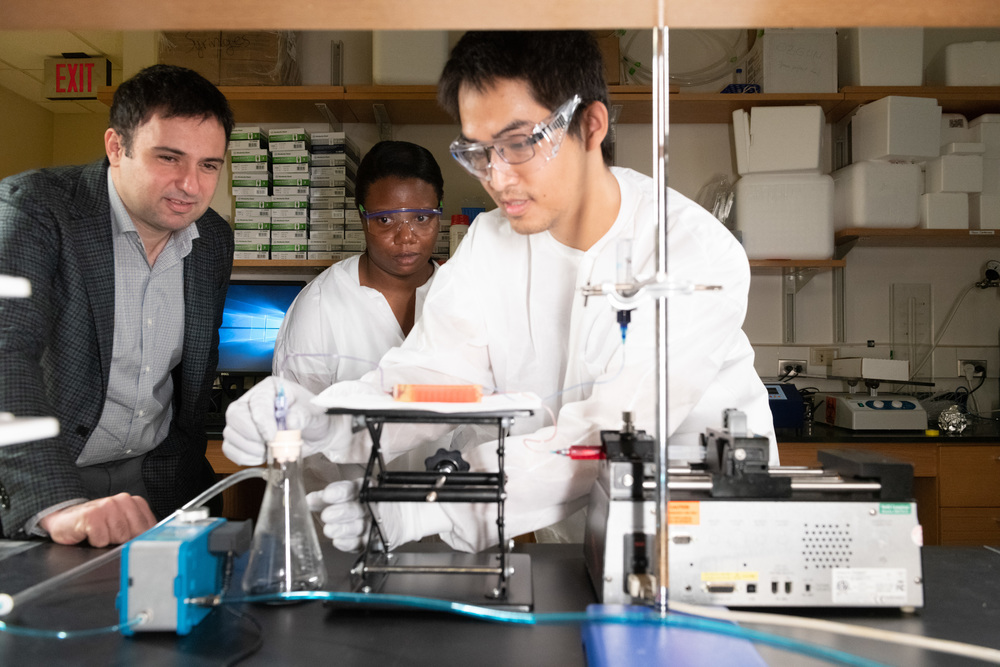The Petit Institute is the home of many research centers. The Petit Institute's role is to provide infrastructure to support research centers so that each center does not have to try to maintain its own staff and resources. Support comes in the form of access to core facility usage as well as other services such as accounting, marketing, and website support, event planning, multi-investigator proposal development, industry relations, and tech transfer to facilitate center operation.
Cancer Technology Innovation Center (CTIC)
Georgia Tech leads the development of transformative innovations to better predict, diagnose and treat cancer more safely, with fewer side effects, to benefit more patients. The mission of the Cancer Technology Innovation Center (CTIC) is eliminating the health burden of cancer through technology innovation and cancer research.
https://ctic.research.gatech.edu/
Cell Manufacturing Technologies (CMaT)
CMaT will enable robust, scalable, low-cost biomanufacturing of high-quality therapeutic cells to bring affordable, curative therapies against incurable chronic diseases to everyone. This will transform healthcare, improve the economy, add new jobs, and enhance national security.
Center for 3D Medical Fabrication
The Center for 3D Medical Fabrication (3DMedFab) at Georgia Tech provides rapid prototyping of a wide range of multiple biomaterials in 3D.
Center for Immunoengineering
At the Center for Immunoengineering at Georgia Tech engineers, chemists, physicists, computational scientists, and immunologists come together to collaboratively understand how the immune system works and find breakthrough solutions to improve the lives of patients suffering from cancer, infectious diseases (e.g. HIV, tuberculosis, hepatitis, polio etc.), autoimmune and inflammatory disorders (e.g. diabetes, lupus, multiple sclerosis, arthritis, fibrosis, asthma etc.) as well as those undergoing regenerative therapies (e.g. organ transplantation, spinal cord injury, bone and cartilage repair, etc.).
Center for Integrative Genomics
The Center for Integrative Genomics (CIG) at Georgia Tech is a virtual affiliation of researchers interested in the application of genome-wide research strategies to diverse biological themes. The goals of the center are to: Conduct quantitative genetic analysis of Genomes, Transcriptomes, Proteomes, Metabolomes and Phenomes and foster partnerships within the School of Biology, across Georgia Tech, and with collaborators in the Atlanta region.
Center for The Origin of Life
The Cool Center is a part of NASA’s Prebiotic Chemistry and Early Earth Environments (PCE3) Consortium, one of five Research Coordination Networks within the Astrobiology Program. The PCE3 Consortium is focused on investigating the delivery and synthesis of small molecules under the conditions of the Early Earth, and the subsequent formation of proto-biological molecules and pathways that lead to systems harboring the potential for life.
Center for Pharmaceutical Development
The Center for Pharmaceutical Development (CPD), established in February 2010, provides a forum for academic and industrial scientists to develop novel approaches for the improvement of pharmaceutical API manufacturing, for product formulation, and for analytical methods. The distinctive strengths of each of the University partners will provide industrial participants with unique opportunities to advance topics on the manufacturing, formulation and analysis of pharmaceuticals. The Center facilitates technologies such as the creation of more selective and robust biological and chemical catalysts that allow more streamlined processes, the development of improved methods for stabilizing drugs and vaccines to protect the nation’s drug supply, and the design of new techniques for the nondestructive evaluation of pharmaceutical products.
Georgia Center for Medical Robotics
The Georgia Center for Medical Robotics (GCMR) brings together people with expertise in several areas of medicine as well as technology development from the nano-scale to macro-scale. GCMR is highly interdisciplinary, comprised of people from the Georgia Institute of Technology, Emory University, Children’s Healthcare of Atlanta (CHOA), and Morehouse School of Medicine. One of its unique features is that it addresses the needs of both adult and pediatric populations.
Marcus Center of Excellence for Cell Biomanufacturing
The Marcus Center of Excellence for Cell Biomanufacturing, housed at Georgia Tech, is a team of researchers that provide end-to-end R&D solutions for the whole spectrum of cell manufacturing needs. The center brings together clinicians, industry researchers, product developers, scientists, and engineers to tackle the challenge of highly controlled, well-characterized, efficient, reproducible, and high-quality therapeutic cell manufacturing.
Pediatric Innovation Network
The Georgia Tech Pediatric Innovation Network accelerates the development and clinical utility of new medical technologies to improve the health outcomes of pediatric patients close to home and around the world. We connect researchers including engineers, data analysts, scientists and others with front line pediatric clinicians, nationally and internationally, to create new technologies for their stated unmet pediatric healthcare needs. We further connect those parties to the funding, institutional, development, regulatory and industrial resources needed to make them clinically and commercially viable.
Regenerative Engineering and Medicine (REM)
The Regenerative Engineering and Medicine (REM) research center is a joint collaboration between Emory University and Georgia Tech. REM is specifically focused on endogenous repair or how the body can harness its own potential to heal or regenerate. Bone, muscle, nerves, heart, blood vessels, and other tissues each have a baseline ability to regenerate. REM investigators ask what can be done when trauma or disease in humans overwhelms the ability of tissues or organs to regenerate on their own.





